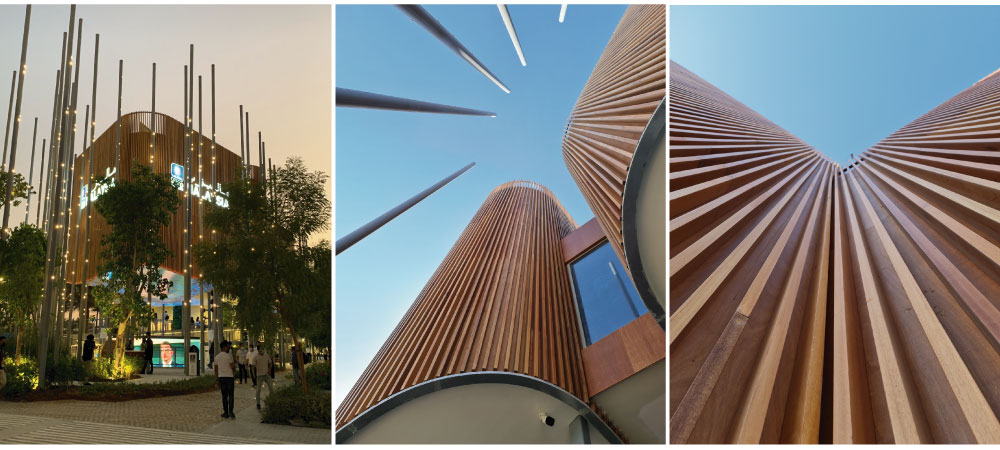The meranti wood decks the Malaysia Pavilion façade as a bold statement of the country’s Sustainable Forestry Practices
KUALA LUMPUR – At Expo 2020 Dubai, Malaysia Pavilion will prominently feature the country’s timber and timber products and policies underpinning the sustainable development of the industry.
The pursuance of the sustainable development of the timber industry within the agricommodity sector will be the key narratives for visitors and trade delegates to the Pavilion.
Aptly representing this message, the Malaysian red meranti wood is used as building material to make a bold statement of the country’s sustainable forestry resources. The timber hardwood decks the façade and makes a striking feature for Malaysia’s Rainforest Canopy Pavilion at the 438 ha. expo site in Dubai.
“Malaysia Pavilion’s theme for the world expo, which will be held from 1 October 2021 to 31 March 2022, is “Energising Sustainability” and the meranti aptly represents Malaysia’s commitment to our sustainable forestry practices and timber products.

“Sustainable Forest Management (SFM) practices have been adopted by Malaysia since almost half a century ago. Additionally, the material used is fully certified under the Malaysian Timber Certification Scheme (MTCS) providing the assurance that the material was harvested from sustainably managed forests. The MTCS is endorsed by the Programme for Endorsement of Forest Certification (PEFC), the largest forest certification system in the world,” said the Malaysian Timber Certification Council (MTCC) Officer-in-Charge, Siti Syaliza Mustapha.
Hailing from the famous Dipterocarpaceae family of the plant kingdom, Meranti is the largest group of hardwood tree belonging to the genus Shorea of 196 species. Named after Sir John Shore, the governor-general of the British East India Company, Shorea spp are native to Southeast Asia.
A darling of the timber industry with its deep brownish-red tone, the Meranti has a high resistance to warping or twisting and perfect for moulding and interior woodworking.
Malaysia Pavilion is inspired by the country’s rainforests and symbolises the country’s commitment to protect the ancient biosphere as the lung of the planet. Every element in design and construction illustrates Malaysia’s sustainability theme.
“When it comes to ensuring a sustainable future, Malaysia believes in the importance of conserving forests and their ecosystems through SFM which has been at the core of our conservation efforts since Malaysia pledged at the 1992 Earth Summit to maintain at least 50% of its land mass under forest and tree cover.
“SFM is particularly imperative for Malaysia as a timber producing and exporting country to create a balance between reaping the benefits from the forest resources and being committed in securing their sustainability via responsible supply chain. It also positively contributes to the attainment of the Sustainable Development Goals and the fight against climate change” said Siti Syaliza.
Hence, the new Malaysian Forestry Policy, launched on 21 March 2021, reaffirms the importance of certification as a crucial tool, with special reference to the MTCS in promoting SFM which is operated by the MTCC.
As a voluntary national scheme, the MTCS provides for independent assessment of forest management practices within a certain forest management unit (FMU) or forest plantation management unit (FPMU) to ensure they meet the requirements of the prescribed forest management certification standard i.e. the Malaysian Criteria and Indicators for Sustainable Forest Management (MC&I SFM).
Additionally, it provides for independent audit of timber product manufacturers or exporters through Chain of Custody (CoC) certification to ascertain that the timber-based products manufactured or exported are sourced from sustainably managed forests.
The MTCS is the first tropical forest scheme in Asia Pacific to be endorsed by the PEFC. As a PEFC endorsed scheme, the operation of the MTCS has been significantly strengthened to meet international sustainability benchmarks. PEFC’s endorsement enables the MTCS to be mutually recognised by 47 other PEFC endorsed schemes and accepted under the national timber procurement policies of many developed countries notably in Europe. All MTCS certified timber products are allowed to carry the PEFC label, which is a label that provides assurance that the products are manufactured from sustainably sourced timber.
Apart from requiring timber companies to adopt good manufacturing practices, certification leads industry players to keep abreast with technology advancement and the growing trend of green products where the demand for ethically sourced timber is high. As a marketing tool, certification gives the local industry players a competitive edge to compete at the global level.
Besides the 386 CoC certificate holders, a total of 5.27 million hectares of forests have been certified under the MTCS, which include 22 FMUs and nine FPMUs, as of 31 August 2021. The annual export of certified timber and timber products have notably increased over the years, with a cumulative total of 2.47 million cubic metres exported to 72 destinations across the globe, as of 31 December 2020.
Malaysia’s sustainable timber and timber-based products will be promoted through the Pavilion’s permanent exhibits as well as through the week-long trade and business programme on Sustainable Agricommodities (Non-Food) to be led by the Ministry of Plantation Industries and Commodities and Malaysian Timber Council from (23rd to 29th January 2022.
Malaysia also aims to take advantage of the global event to increase trade of this commodity with the Middle East which is identified as a market with vast potential for expansion. The UAE’s importance as a market for Malaysia is evident with the existence of the Malaysian Timber Council (MTC) regional office for Middle East and Africa in Dubai.
In 2020, Malaysia was in the Top 10 for global timber exports of plywood (5th), wooden furniture (6th), wooden frame (6th), mouldings (9th), and in the Top 20 for sawntimber (13th), fibreboard (17th) and Builders’ Joinery and Carpentry (18th).
“In 2020, exports of timber and timber-based products to the UAE stood at USD77.2 million. Furniture, sawntimber and fibreboards are some of the main timber products exported to the UAE. The Middle East on the whole is a significant market for Malaysia, and the focus will be to work towards expanding our business collaborations,” said Malaysian Timber Council Chief Executive Officer Mr. Muhtar Suhaili.
